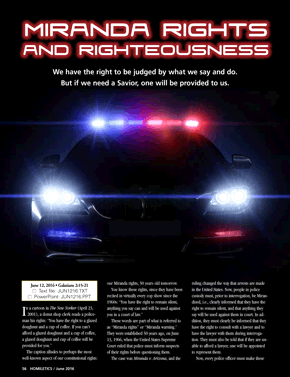
Miranda Rights and Righteousness
| Galatians 2:15-21
It's the 50th anniversary of the Miranda ruling. SCOTUS addressed the issue of a suspect's rights. The apostle Paul explains the meaning of righteousness.
In a cartoon in The New Yorker (April 23, 2001), a donut shop clerk reads a policeman his rights: "You have the right to a glazed doughnut and a cup of coffee. If you can't afford a glazed doughnut and a cup of coffee, a glazed doughnut and cup of coffee will be provided for you."
The caption alludes to perhaps the most well-known aspect of our constitutional rights: our Miranda rights, 50 years old tomorrow.
You know these rights, since they have been recited in virtually every cop show since the 1960s: "You have the right to remain silent. Anything you say can and will be used against you in a court of law."
These words are part of what is referred to as "Miranda rights" or "Miranda warning." They were established 50 years ago, on June 13, 1966, when the U.S. Supreme Court ruled that police must inform suspects of their rights before questioning them.
The case was Miranda v. Arizona, and the ruling changed the way that arrests are made in the United States. Now, people in police custody ...
Start today. Cancel any time.
Act now and, for just $7.99 a month or $84.95 a year, you’ll receive a full year of this valuable sermon preparation resource.
Our convenient, continuous-subscription program ensures you'll never miss out on the inspiration you need, when you need it.
You’re never obligated to continue. Naturally, you may cancel at any time for any reason, no questions asked.